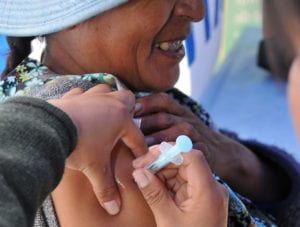Don’t let sickness ruin your travels

A Level 2 Alert means there is an “increased risk” of specific diseases in affected areas. Level 2 Alerts come with two basic recommendations. Travelers should “follow enhanced precautions” and high-risk travelers should consider delaying travel to affected destinations.
Since last year, Brazil’s had an ongoing outbreak of yellow fever at some of its popular tourist destinations, including the Rio de Janeiro and São Paulo areas. Earlier this month, the U.S. Centers for Disease Control and Prevention (CDC) issued an updated Brazil yellow fever Level 2 Alert.
The CDC reports that in Brazil, a number of unvaccinated travelers contracted yellow fever in the last year. Some travelers died of the dread disease.
When planning a trip to Brazil, follow the CDC’s recommendations:
- For those never vaccinated for yellow fever, get vaccinated at least ten days before traveling to Brazil.
- For those with a past yellow fever vaccination, ten or more years ago, get a booster vaccination.
- While in Brazil, take measures to prevent mosquito bites.
Earlier this month, in an article about the world of germs at airports and in planes, I asked, “Is there anything much worse than getting sick while you travel?” If you’re traveling in a health risk hotspot, the answer is yes. You don’t want to become a mortality statistic.
Follow these ten travel disease tips to stay healthy while on the road.
1. Determine travel disease risks long before leaving:
When first planning your journey, learn about the health risks you could encounter at your destination(s). You might find you’re considering travel to a CDC Warning Level 3 destination, meaning travel elsewhere.
Use the CDC’s website Destination area for international travel disease planning. Search it for each destination you’re considering when you start your travel planning. Refer back to it often.
In addition to the CDC, use the World Health Organization (WHO) website. They have excellent country assessments, including data on travel disease outbreaks and crises. The U.S. State Department has country information which includes data on health, medical facilities and medical insurance.
2. Vaccinations:
You may need vaccinations before you travel. Your local physician can help you. Since many vaccinations don’t become effective immediately and some aren’t readily available, don’t wait until the last minute to get them. In the U.S., if your physician can’t provide them or direct you to a clinic, the CDC clinic page can help you locate vaccination sites.
3. Have a supply of your medication before leaving:
Before you leave, gather an adequate supply of every medication you take regularly or may need while traveling, including enough if your stay is extended for an emergency.
Keep prescription medications in their clearly labeled, original container to avoid problems at your destinations. Travelers should check with their destination country’s embassies to ensure any required medications which contain a narcotic are not considered illegal there.
Pack your medications in your carry-on luggage to ensure continuous access to it in case of emergency or lost or delayed luggage.
4. Get medications for health emergencies:
Talk with your physician about your trip and what medications you should take to handle health emergencies such as diarrhea. Diarrhea and other gastrointestinal problems are the most common travel related illnesses. Dehydration from diarrhea is serious for travelers. Bring medications recommended by your physician to combat these illnesses with your other drugs.
5. Ensure you have travel medical insurance coverage:
Make sure you have health insurance coverage when you travel. Outside your home country, your health insurance may or may not provide coverage.
NOTE: U.S. Medicare and Medicaid provide no health coverage outside the U.S., with rare exceptions
You may need to purchase primary or supplemental health insurance to cover you while traveling. When choosing travel health insurance, purchase coverage which includes medical evacuation costs. Medivac transportation can be very expensive.
6. Assemble your medical history:
If you take prescription medication regularly or have a preexisting medical condition, bring a complete medical history describing your medical conditions, medications (include their generic names), and include the names and contact information for your physician(s). This information could be essential to successfully treat you in case you become ill.
7. Bring a travel first aid kit:
Injuries occur when traveling. Bring a first aid kit to handle non-serious common injuries.
8. Be sure of the water you drink while traveling:
In developing countries avoid drinking or even brushing your teeth with tap water. Drink and use bottled water. In restaurants, diplomatically ensure you’re served bottled water, not water bottles refilled with tap water. If you can’t buy bottled water, sterilize it by boiling or dropping in purification tablets or iodine. You could also use a SteriPen, which is what I take on every trip.
9. Ice for your beverages:
If you like ice for beverages, skip it unless you know it’s made from bottled water.
10. Foods to avoid:
Avoid ice cream, raw seafood, unpasteurized dairy products, salads and other uncooked food unless you can peel or shell it yourself. Too many travelers get diarrhea after eating such food while traveling.
Taking the precautions in the above list can help you have an enjoyable journey and could save your life.
After many years working in corporate America as a chemical engineer, executive and eventually CFO of a multinational manufacturer, Ned founded a tech consulting company and later restarted NSL Photography, his photography business. Before entering the corporate world, Ned worked as a Public Health Engineer for the Philadelphia Department of Public Health. As a well known corporate, travel and wildlife photographer, Ned travels the world writing about travel and photography, as well as running photography workshops, seminars and photowalks. Visit Ned’s Photography Blog and Galleries.



